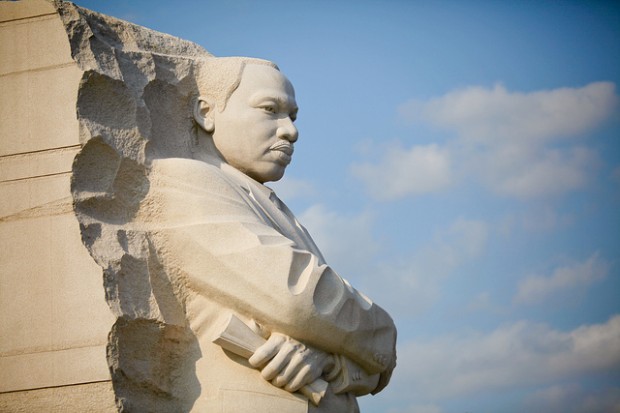MLK Memorial: A Complex D.C. Legacy
The Martin Luther King, Jr. Memorial, dedicated on Sunday as a tribute and reminder that King’s vision of equality isn’t yet fully realized, evokes an additional memory for those living in D.C. The statue is a reminder of the pain and frustration felt after King’s assassination, which gave birth to the 1968 riots that forever changed D.C.’s landscape, setting the stage for the gentrification the city is undergoing today.
One of Sunday’s speakers, president of the Children’s Defense Fund Marian Wright Edelman, shared this moving recollection from that moment in time:
The day after Dr. King was shot, I went into riot-torn Washington, D.C. neighborhoods and schools, urging children not to loot, get arrested and ruin their futures. A 12-year-old black boy looked at me straight in the eye and said, “Lady, what future? I ain’t got no future. I ain’t got nothing to lose.”
When news broke of King’s death, many young people in particular took to the streets. Although it was peaceful at first, the gatherings across the city turned violent, with people looting, burning down more than 1,000 buildings and destroying many stores.
After the riots, many whites and well-to-do residents left for the suburbs. Storefronts remained empty for decades and the city’s economy was devastated. The crack epidemic only made matters worse, and crime rates soared. But now that D.C. is experiencing an economic resurgence from the riots’ effects, the city is also losing many of its black and poor residents, some of whom cannot afford a more expensive city. There are more opportunities for many of D.C.’s young people than there were in 1968, but many black youth are still not in school or working.
Edelman, who spoke of the despair of that 12-year-old black boy in 1968 D.C., also called upon King’s legacy to inspire continued action:
… It is time for the United States and for the black community and all of us to prove that boy’s truth wrong, in our militarily powerful, materially rich but spiritually poor nation, and to honor the sacrifice of this great prophet of God who died to help redeem the soul of America. Dr. King is not coming back. We’re it. He told us what to do. Let’s honor him by doing it.
Despite all of D.C.’s racial and class disparities, there are dedicated people working to make positive changes, whether it be parents working to improve D.C.’s failing schools or activists creating more employment opportunities for D.C. youth. There may be debates over the tactics, but these groups are diverse. Just like the crowds who visit the King memorial, reflecting on his legacy.







